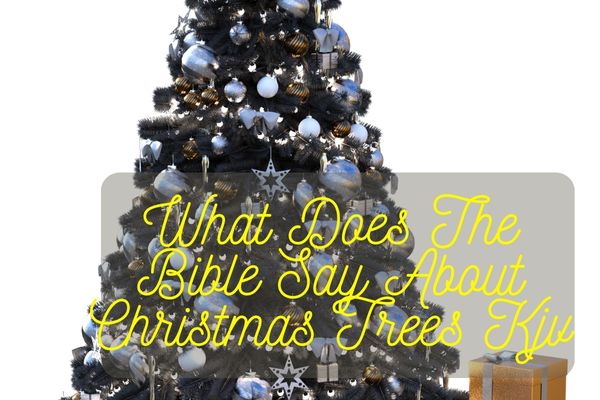Table of Contents Show
In the heart of the holiday season, as we deck the halls and gather around festive displays, a curious question often arises: What does the Bible say about Christmas trees kjv? Looking into this inquiry not only unravels the spiritual significance of a beloved tradition but also opens a door to explore the rich variety of biblical wisdom surrounding the festive adornment of evergreen trees.
The King James Version (KJV) of the Bible, known for its eloquence and historical significance, becomes our guide in navigating the depths of this question. In the pages of scripture, we seek insights, symbolism, and perhaps a nuanced perspective on the age-old practice of bringing a Christmas tree into our homes.
Join us on this journey of discovery as we explore the profound meanings, biblical references, and timeless wisdom associated with what the Bible says about Christmas trees KJV. From ancient traditions to scriptural insights, we embark on a quest to understand the spiritual context that enriches our festive celebrations. So, let the pages of the KJV Bible unfold, revealing the hidden gems of wisdom that illuminate the age-old question: What does the Bible say about Christmas trees?
What Does The Bible Say About Christmas Trees Kjv
Embracing the joy of the holiday season often involves festive decorations, and for many, a central piece is the Christmas tree. look into the biblical perspective as we explore what does the Bible say about Christmas trees KJV. Uncover the spiritual context, biblical references, and timeless wisdom surrounding this beloved tradition.
A Pagan Tradition or a Festive Symbol?
The Christmas tree, adorned with twinkling lights and shimmering ornaments, is a quintessential symbol of the holiday season. But where does this tradition originate, and what does the Bible, specifically the King James Version (KJV), say about it?
No Direct Mention of Christmas Trees
Interestingly, the Bible makes no direct mention of Christmas trees or their use in celebrating the birth of Jesus Christ. The verses most often cited in discussions about Christmas trees caution against adopting pagan practices. Jeremiah 10:3-4, for instance, states:
“For the customs of the people are vain, for one cutteth a tree out of the forest, the work of the hands of the workman, with the axe. They deck it with silver and with gold; they fasten it with nails and with hammers, that it move not.” (KJV)
This passage criticizes idol worship and the veneration of man-made objects, which some interpret as extending to Christmas trees. However, it’s important to note that the context specifically refers to worshipping idols, not using trees for decorative purposes.
Symbolism and Significance
The Bible does mention trees frequently, often using them as symbols of God’s presence, blessing, and strength. Isaiah 60:13 prophesies:
“The glory of Lebanon shall come unto thee, the fir tree, the pine tree, and the box tree together, to beautify the place of my sanctuary; and I will make the place of my feet glorious.” (KJV)
Here, trees represent beauty, holiness, and divine favour. Similarly, in 1 Chronicles 16:33, trees are called upon to sing for joy before the Lord.
Shifting Traditions and Cultural Influences
The tradition of decorating trees during winter predates Christianity and has roots in various pagan cultures. In ancient Rome, December celebrations involved decorating fir trees with ornaments to honour the god Saturn. Germanic tribes also worshipped trees and believed they housed spirits.
These pagan customs gradually blended with Christian traditions over time. In the Middle Ages, evergreen trees were sometimes used in nativity plays to represent the Garden of Eden or Paradise. By the 16th century, the practice of decorating Christmas trees emerged in Germany, eventually spreading throughout Europe and beyond.
A Matter of Faith and Personal Conviction
The Bible’s silence on Christmas trees leaves room for individual interpretation and cultural expression. Some Christians see no harm in decorating trees as long as the focus remains on celebrating the birth of Christ. Others choose to avoid the tradition altogether, concerned about potential ties to pagan practices.
Ultimately, the decision of whether or not to have a Christmas tree is a personal one. It’s important to approach the issue with respect and understanding of diverse viewpoints within the Christian community.
Focusing on the True Meaning of Christmas
Regardless of individual choices regarding Christmas trees, the core message of the holiday season remains unchanged: celebrating the birth of Jesus Christ and the hope and joy it brings to the world. Whether adorned with twinkling lights or not, the true spirit of Christmas lies in remembering the significance of this event and sharing love, kindness, and compassion with others.
Remember, the most important aspect of Christmas is not the decorations or traditions, but the celebration of Jesus’ birth and the message of love and hope that he brought to the world. So, whether you choose to have a Christmas tree or not, focus on cherishing the true meaning of the season and spreading joy to those around you.
Conclusion
Navigating what the Bible says about Christmas trees KJV requires a balanced and nuanced perspective. By understanding biblical symbols, exploring relevant scriptures, and addressing common questions, we can celebrate the holiday season with joy and spiritual depth.
Embrace the festivities, keeping in mind the true essence of Christmas—a celebration of hope, love, and everlasting light.








